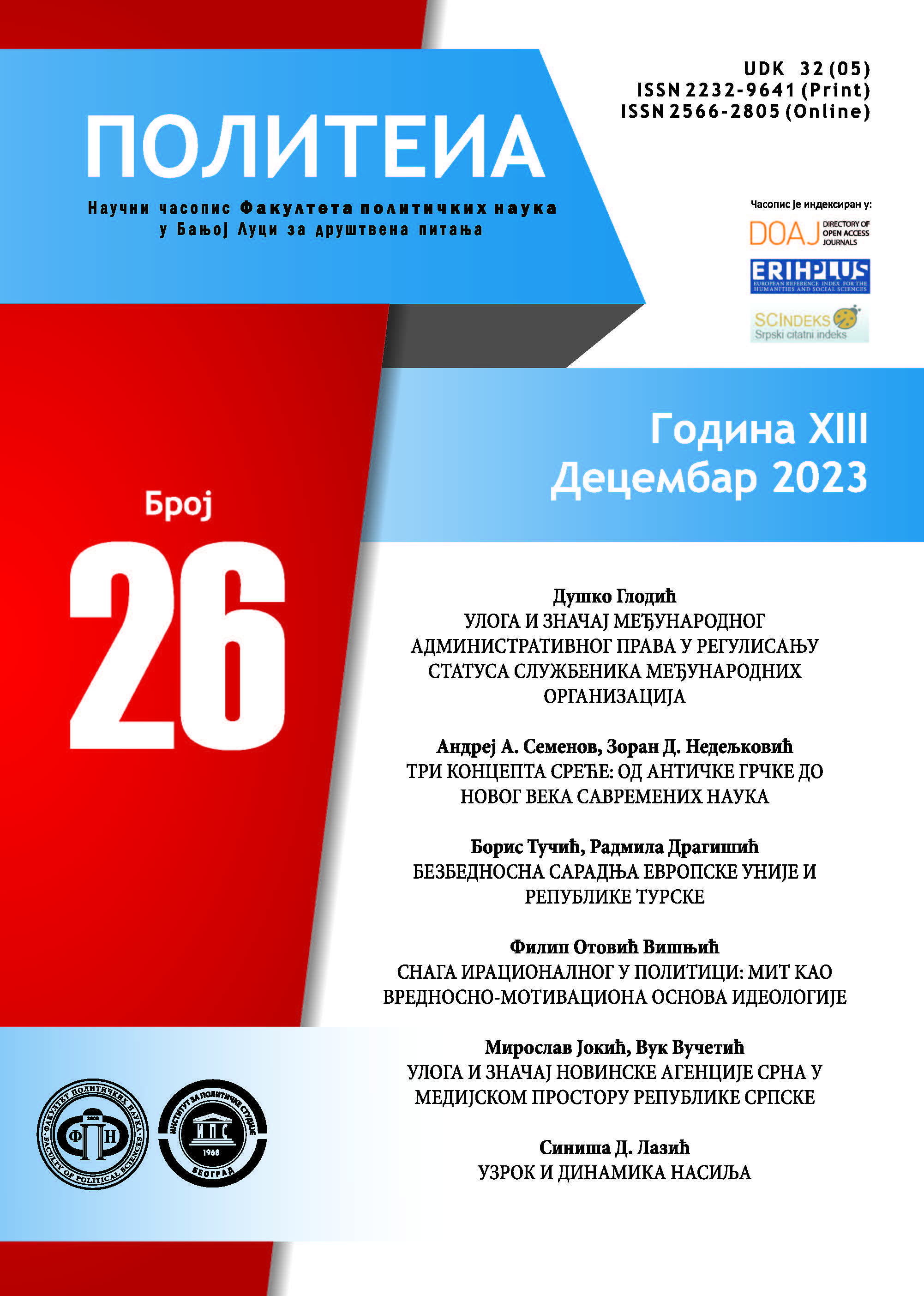ROLE AND IMPORTANCE OF INTERNATIONAL ADMINISTRATIVE LAW IN REGULATING THE STATUS OF THE OFFICIALS OF INTERNATIONAL ORGANISATIONS
Abstract
The aim of this article is to identify, starting from the theoretical framework for considering the activities of international organizations and relevant institutional practices, the basic factors of the legal status of international officials as established in the rules of international administrative law. The article, first of all, defines the concept of international administrative law. Then, the article clarifies the international legal framework for the autonomous regulation of the status of international civil servants by international organizations, and it analyzes the legal sources of international administrative law. Finally, the article points to the influence that international administrative tribunals had on constituting international administrative law and ensuring its effectiveness. The article demonstrates that the basic features of the international civil service are contained in the fact that international organizations, as independent subjects of international law, autonomously regulate issues of importance for their functioning by adopting their own rules. The article also showed that the effectiveness of international administrative law is ensured through the operations of the international administrative tribunals, as a type of judicial body established within the institutional system of an international organization. The article concludes that international administrative law is particular for each international organization, but that there is a similarity between certain concepts and principles that exist in the rules of various international organizations. Considering importance of the international officials in executing the functions of an international organization, international administrative law, as a legal framework that regulates their position and guarantees their independence from individual governments, is of essential legal relevance for the smooth operation of the international organization as an international legal person.
References
Ago, S. (2020). What is ‘International Administrative Law’? The Adequacy of this Term in Various Judgments of International Administrative Tribunals. In: Quayle, P. (ed.) The Role of International Administrative Law at International Organizations, (pp. 88‒102). Leiden/Boston: Brill Nijhoff.
Amerasinghe, C.F. (2005) Principles of the Institutional Law of International Organisations, 2nd edition, Cambrigde: Cambridge University Press.
Archer, C. (2001). International organizations. London and New York: Routledge.
Benvenisti, E. (2004). The interplay between actors as a determinant of the evolution of administrative law in international institutions. Law & Contemporary Problems, 68, pp. 319‒340.
Daillier, P., Forteau, M., & Pellet, A. (2010). Droit international public, Paris: LGDJ, Lextenso éditions.
Eastman, D.J. (2020). The Terms and Conditiomns of Employment of International Civil Servants: Implied Terms Recognized by the Asian Development Bank Administrative Tribunal, In: Quayle, P. (ed.) The Role of International Administrative Law at International Organizations, (pp. 103‒115). Leiden/Boston: Brill Nijhoff.
Holly, D. (1985). Bureaucratie internationale et détermination de la ligne générale des organisations internationales: le cas de l’UNESCO, Études internationales, 16(4), 757‒770.
Kryvoi, Y. (2015). The law applied by international administrative tribunals: From autonomy to hierarchy, George Washington International Law Review, 47, 267‒301.
Meighan, K. & Rodriguez-Rico, G. (2020). To Join or Not to Joim: A Comparative Analysis of Joining or Creating an International Administrative Tribunal. In: Quayle, P. (ed.) The Role of International Administrative Law at International Organizations, (pp. 119‒140). Leiden/Boston: Brill Nijhoff.
Reymond, H. (1970). Some unresolved problems of the international civil service. Public Administration Review, 30(3), 225‒236.
Shaw, M. (2003). International Law. Cambridge: Cambridge University Press.
Vallejo, D. D. V. (2002). Les organisations internationales. Paris: Economica.
Quayle, P. (2020). The Modern Multilateral Bureaucracy: What is the Role of International Administrative Law at International Organizations?. In: Quayle, P. (ed.) The Role of International Administrative Law at International Organizations, (pp. 1‒21). Leiden/Boston: Brill Nijhoff.
Charter of the United Nations, посјећено 30. 10. 2023 https://www.un.org/en/about-us/un-charter/full-text .
Constitution of the United Nations Educational, Scientific and Cultural Organisation, посјећено 30. 10. 2023. https://www.unesco.org/en/legal-affairs/constitution?TSPD_101_R0=080713870fab2000d0597f5632664691ce4e8cba474d32267d0d70fe540cd7b060266800540a20ca08e3f65a3f143000e50f0d1a075e182937c78c670b01c15a93f4d6dd7fd7021ec406c72defd89ce489bfff4d2c9f21f61b97e61885b43d7a .
Convention on the Organisation for Economic Co-operation and Development, посјећено 30. 10. 2023. https://www.oecd.org/about/document/oecd-convention.htm#Text .
Vienna Convention on the Law of Treaties between States and International Organizations or between International Organizations, 1986, United Nations publication, Sales No. E.94.V.5.
World Bank Administrative Tribunal, Louis de Merode et Al. v. The World Bank, Decision No. 1, 5 June 1981.
Administrative Tribunal of the International Monetary Fund, Mr R v. IMF, Judgement No. 2002-1, 5 March 2002.
UN Dispute Tribunal, Samrdzic et al. v. UN Secretary General, 2010.
Autori koji objavljuju u ovom časopisu pristaju na sljedeće uslove:
- Autori zadržavaju autorska prava i pružaju časopisu pravo prvog objavljivanja rada i licenciraju ga "Creative Commons Attribution licencom" koja omogućava drugima da dijele rad, uz uslov navođenja autorstva i izvornog objavljivanja u ovom časopisu.
- Autori mogu izraditi zasebne, ugovorne aranžmane za neekskluzivnu distribuciju članka objavljenog u časopisu (npr. postavljanje u institucionalni repozitorijum ili objavljivanje u knjizi), uz navođenje da je članak izvorno objavljen u ovom časopisu.
- Autorima je dozvoljeno i podstiču se da postave objavljeni članak onlajn (npr. u institucionalni repozitorijum ili na svoju internet stranicu) prije ili tokom postupka prijave rukopisa, s obzirom da takav postupak može voditi produktivnoj razmjeni ideja i ranijoj i većoj citiranosti objavljenog članka (Vidi Efekti otvorenog pristupa).

